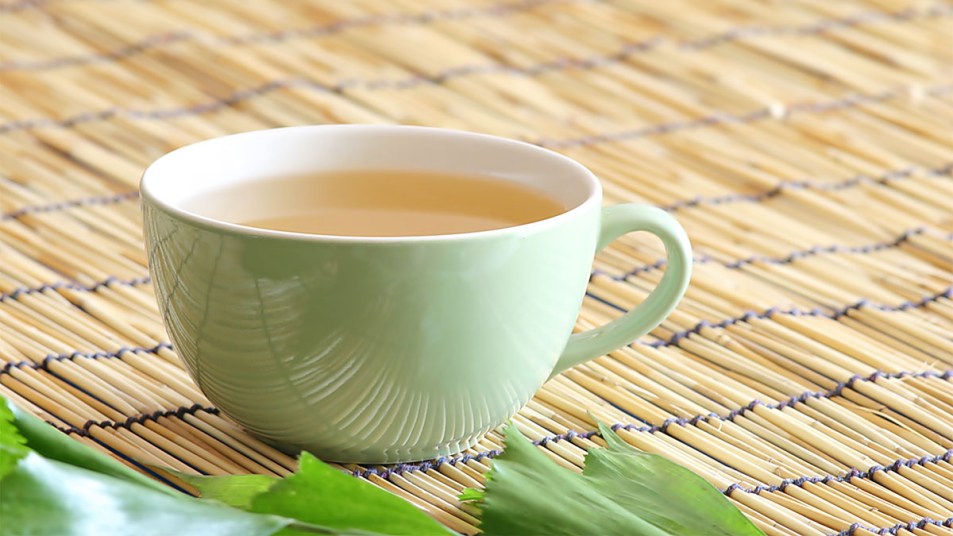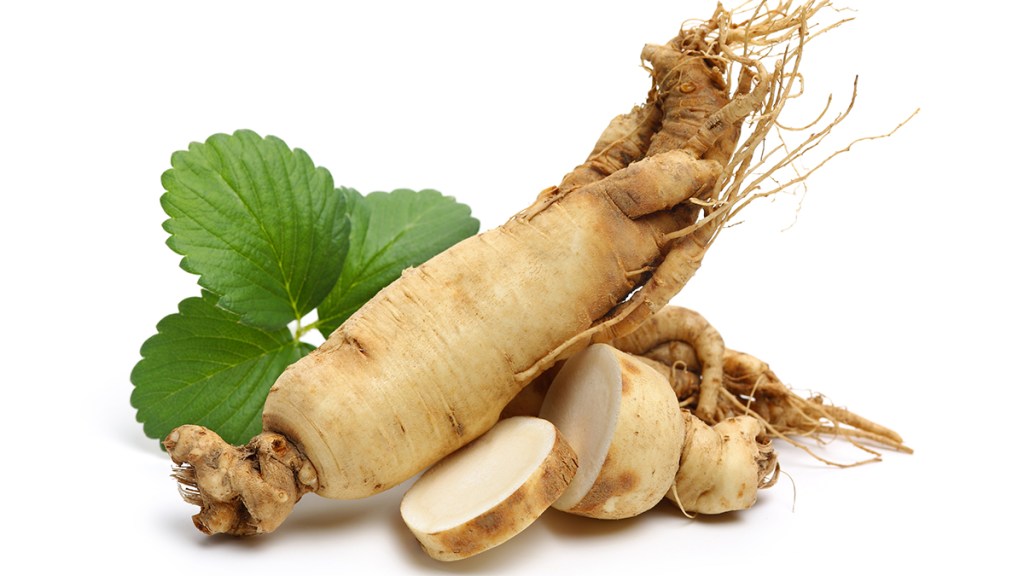Surprise: Studies Show That Ginseng Tea Can Help Cure Chronic Tiredness, Dial Down Hunger, Reverse Thinning Hair and More!
No wonder it's been considered Nature's medicine for more than 5,000 years!

With roots in Traditional Chinese Medicine (TCM), ginseng tea has been used by health practitioners in the Far East for thousands of years to promote vitality and enhance well-being. And for good reason, say modern scientists who’ve recently pinpointed the amazing benefits of ginseng tea.
The Asian ginseng plant was discovered more than 5,000 years ago in the mountains of Manchuria, China. So powerful were the plant’s healing properties, only royalty and other nobles could use it. Indeed, stories of ginseng’s powerful benefits spread far and wide, earning it the nickname King of Herbs. But “Queen of Herbs” might make more sense, as its natural compounds are particularly beneficial for women.
Here’s a closer look at those benefits through the lens of modern science, so you can determine if ginseng tea is right for you:

What is ginseng tea?
Ginseng tea is an herbal supplement made from the ginseng root. You can boil the root itself or buy ginseng tea bags at the grocery store.
Two plants are used to make ginseng tea:
Asian ginseng (Panax ginseng) and American ginseng (Panax quinquefolius, L). Both have similar benefits but different chemical makeups.
You might hear ginseng referred to in terms of color: Both white ginseng and red ginseng come from the Asian ginseng plant, but they are prepared differently. White ginseng is dried in the sun, while red ginseng is steamed and then dried until it has a less than 15% moisture content.
“Asian ginseng is considered more stimulating and energizing, while American ginseng is considered more cooling and calming,” says Mary Sabat, MS, RDN, LD, a registered dietitian nutritionist and ACE-certified trainer.
Scientists aren’t sure where ginseng’s healing power comes from, but ginsenosides play a role. These compounds, which are produced by the ginseng plant, boast antiallergic, antidiabetic and anti-inflammatory properties.
What benefits can ginseng tea provide?
No matter which variety of ginseng tea you choose, “drinking it offers a variety of potential benefits. Many people use it as an adaptogen — a substance that helps the body cope with stress and promotes overall well-being,” says Sabat. From its ability to increase energy and promote healthy immunity and aging, it’s no wonder ginseng is often called “Green Gold!”
Here are 6 benefits of ginseng tea.
1) Weight Loss
Several studies have cited a link between ginseng tea and weight loss. One, published in the Journal of Exercise and Rehabilitation, found that ginsenosides increase the effects of cholecystokinin (CKK), a hormone that aids with digestion. Scientists found that in animal models, ginsenosides made test subjects feel fuller, for longer. Try drinking a cup of ginseng tea when you get cravings in between meals to reap the slimming benefits.
2) Improved energy
Women are nearly twice as likely to suffer from fatigue as men, so including ginseng tea in your diet makes sense. Consider that a review of 10 different studies found that ginseng significantly improved the effects of chronic fatigue syndrome compared to a placebo.
Bonus: Not only does ginseng tea have the potential to help you feel more alert, it does so with the risk of the jitters caffeine causes. (Click through to learn if your allergies are making you tired, too.)
3) Healthier, younger-looking skin
Ginseng is a popular ingredient in many skincare products and it’s been used in parts of Asia as a beauty aid for centuries. For example, it’s rumored that Hwang Jini, a Korean poet and dancer who lived during the 1500s, drank ginseng tea to maintain a beautiful complexion.
“Ginseng tea may support healthy skin in a few ways,” says Bill Bradley, RD, a registered dietitian and the co-author of Foods of Crete: Traditional Recipes from the Healthiest People in the World (Buy from Amazon, $20.00). “Its antioxidant properties help protect the skin from damage. Some research also suggests ginseng may promote skin hydration, reduce wrinkles and enhance the production of collagen, which can help maintain skin elasticity.”
4) Stronger, thicker hair
As many as 50% of women experience hair loss at some time during their lives, and that number increases to 80% as we age. Losing hair can negatively affect confidence and self-esteem, but a natural remedy like ginseng tea may provide relief.
One study found that ginseng has compounds that help regulate proteins responsible for hair growth. Another found that ginseng increased the number of dermal cells on the scalp, helping strengthen the hair follicles and hair roots. To get the perks, try massaging ginseng tea (once cooled) into your hair or buy a ginseng-infused shampoo.
(Click through for new research that reveals how onion juice works to reverse thinning hair and slow down the graying process.)
5) Improved blood sugar
Diabetes affects people of all ages and genders, but for women, the complications are often more severe. If you’re struggling to keep your blood sugar in check, ginseng tea might help.
“Certain compounds in ginseng have been found to have anti-diabetic effects by enhancing insulin secretion, improving glucose metabolism and reducing insulin resistance,” Sabat says.
Try drinking ginseng tea as a complement to diabetes medications. Your doctor can alert you to potential side effects and drug interactions.
6) Enhanced immunity
Autoimmune disorders, like rheumatoid arthritis and Grave’s disease, affect far more women than men, and a healthy immune system can help lower your risk of developing them. Once again, we turn to ginseng tea.
The ginseng plant has powerful antibacterial, antifungal, and antiviral properties. Animal studies confirm these benefits. One, in particular, found that rodents that ate red ginseng experienced an increase in immune cells and liver antioxidants. The sample size was small, but scientists think these immune-boosting benefits might translate to humans.
Is there anyone who shouldn’t drink ginseng tea?
Ginseng tea is safe and usually well-tolerated, but it does cause side effects in some people.
“Pregnant and breastfeeding women should use ginseng cautiously, as not enough is known about its effects during these conditions,” Bradley says. “It’s also important to consider that ginseng may interact with other medications and medical conditions, like high blood pressure (hypertension) and hormone-related issues.”
Talk with your doctor or another qualified healthcare provider before you start enjoying ginseng tea regularly or supplementing. “They can provide guidance based on your personal health history and current medications,” Bradley says.
How do I make ginseng tea at home?
To make ginseng tea at home, you need the following ingredients:
- 1 whole, dried ginseng root or 1-2 tsp. of ginseng powder
- 1 cup of water
- Honey or another sweetener to taste (optional)
Instructions:
Step 1: If you’re using ginseng root, thinly slice it into 5-8 pieces.
Step 2: Pour the cup of water into a pot or tea kettle and bring it to a boil.
Step 3: Add the slices of ginseng root or the ginseng powder to the boiling water.
Step 4: Reduce the heat, cover the pot and let simmer for 15-20 minutes.
Step 5: Strain the tea into a cup, add sweetener (if desired), and enjoy!
What’s the recommended dosage of ginseng tea?
The recommended dosage of ginseng tea varies, depending on the type of ginseng you’re using (dried ginseng root or ginseng powder) and the health condition(s) you’re trying to treat.
Most people start with 1 -2 grams of ginseng root or 200 -400 mg of ginseng root powder. This is because the concentration of active compounds (or ginsenosides) varies based on the form.
Regardless, Bradley recommends starting with a small dose and increasing the amount gradually. “The taste of ginseng is quite strong and unique, which some people find off-putting. If you’re new to ginseng, start with a less concentrated tea (use less ginseng or more water) and gradually adjust the flavor to your liking.
This content is not a substitute for professional medical advice or diagnosis. Always consult your physician before pursuing any treatment plan.












